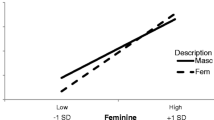Abstract
The achievement behavior of women was examined in relation to their masculinity-femininity of self-concept and the mediating effects of the situation. The masculinity-femininity of self-concept of 58 female subjects was determined through the Personal Attributes Questionnaire (J. Spence, R. Helmreich, and J. Stapp, “The Personal Attributes Questionnaire: A Measure of Sex Role Stereotypes and Masculinity-Femininity,” Catalog of Selected Documents in Psychology, 1974, 4, 43–44). These subjects then competed in either a mixed-sex or same-sex group. Each subject was led to believe she was a high-ability performer in relation to the group members she competed against. While feminine women did not display poorer performance when competing against lower ability males than lower ability females, they did feel more ambivalence than the others about performing successfully in a competitive situation.
Similar content being viewed by others
References
Alagna, S. Sex role identity, peer evaluation of competition, and the responses of women and men in a competitive situation. Journal of Personality and Social Psychology, 1982, 43, 546–554.
Bell, G., & Schaffer, K. The effects of psychological androgyny on attributions of casuality for success and failure. Sex Roles, 1984, 11, 1045–1055.
Bem, S. The measurement of psychological androgyny. Journal of Consulting and Clinical Psychology, 1974, 42, 155–162.
Bem, S. Sex role adaptability: One consequence of psychological androgyny. Journal of Personality and Social Psychology, 1975, 31, 634–643.
Bem, S., & Lenny, E. Sex ty** and the avoidance of cross-sex behavior. Journal of Personality and Social Psychology, 1976, 33, 48–54.
Brehony, K., & Geller, E. Relationships between psychological androgyny, social conformity, and perceived locus of control. Psychology of Women Quarterly, 1981, 6, 204–217.
Horner, M. Femininty and successful achievement: A basic inconsistency. In J. Bardwick, E. Douvan, M. Horner, & D. Gutmann (Eds.) Feminine personality and conflict. Belmont, CA: Brooks-Cole, 1970.
Makosky, V. Sex-role compatibility of task and of competitor, and fear of success as variables affecting women's performance. Sex Roles, 1976, 2, 237–248.
Morgan, S., & Mausner, B. Behavioral and fantasied indicators of avoidance of success in men and women. Journal of Personality, 1973, 41, 457–470.
Orlofsky, J. A comparison of projective and objective fear of success and sex-role orientation measures as predictors of women's performance on masculine and feminine tasks. Sex Roles, 1981, 7, 999–1018.
Orlofsky, J., Aslin, A., & Ginsburg, S. Differential effectiveness of two classification procedures on the Bem Sex Role Inventory. Journal of Personality Assessment, 1977, 41, 414–416.
Spence, J., Helmreich, R., & Stapp, J. The Personal Attributes Questionnaire: A measure of sex role stereotypes and masculinity-femininity. Catalog of Selected Documents in Psychology, 1974, 4, 43–44.
Swanson, M., & Tjosvold, D. The effects of unequal competence and sex on achievement and self-presentation. Sex Roles, 1979, 5, 279–285.
Author information
Authors and Affiliations
Additional information
The author gratefully acknowledges the contributions and support of Dr. M. L. Dietz, Dr. W. Libby, Dr. L. M. Jackson, and Dr. F. Schneider.
Rights and permissions
About this article
Cite this article
Coutts, J.S. Masculinity-femininity of self-concept: Its effect on the achievement behavior of women. Sex Roles 16, 9–17 (1987). https://doi.org/10.1007/BF00302847
Issue Date:
DOI: https://doi.org/10.1007/BF00302847




